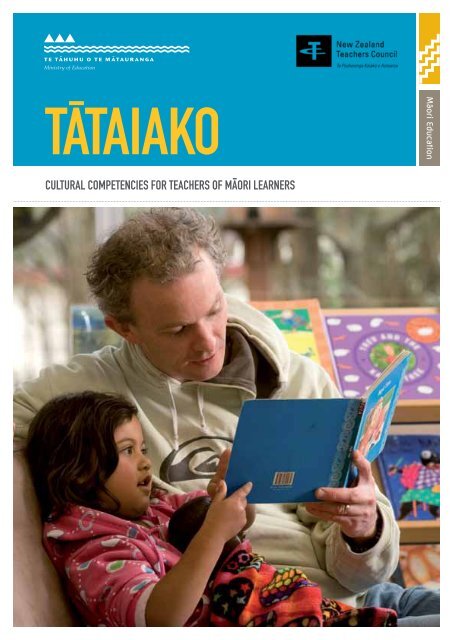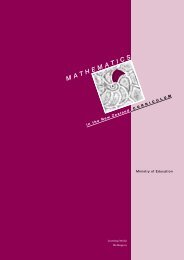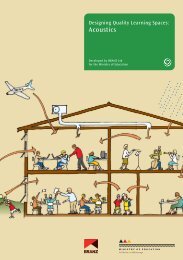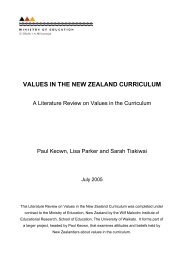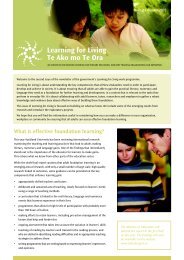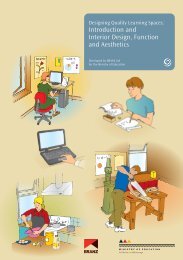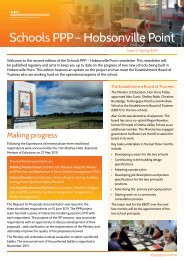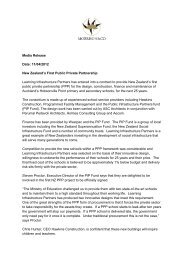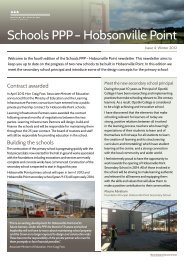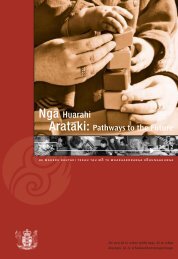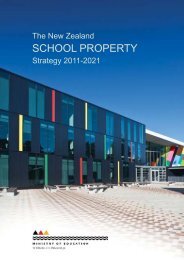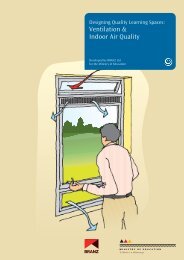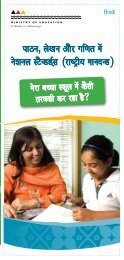Cultural Competencies for Teachers of Māori Learners - Ministry of ...
Cultural Competencies for Teachers of Māori Learners - Ministry of ...
Cultural Competencies for Teachers of Māori Learners - Ministry of ...
Create successful ePaper yourself
Turn your PDF publications into a flip-book with our unique Google optimized e-Paper software.
TATAIAKO<br />
-<br />
CULTURAL COMPETENCIES FOR TEACHERS OF MAORI LEARNERS
TÄTAIAKO: CULTURAL COMPETENCIES FOR TEACHERS OF MÄORI LEARNERS<br />
MANAGING FOR SUCCESS<br />
KA HIKITIA<br />
-<br />
MAORI ACHIEVING<br />
EDUCATION SUCCESS<br />
-<br />
AS MAORI<br />
2<br />
KA HIKITIA<br />
Managing <strong>for</strong> Success
FOREWORD<br />
E ngä iwi, tënä koutou katoa.<br />
E ngä tohunga, ngä pukenga, ngä kaiako i ngä kura o te<br />
motu, tënä koutou.<br />
E ai ki te korero: ‘Whaia te iti kahurangi; ki te tuohu koe,<br />
me he maunga teitei’.<br />
Pursue the highest ideals; if you must submit, let it be to a<br />
l<strong>of</strong>ty mountain.<br />
All <strong>of</strong> us – families, communities, teachers – want our<br />
children to reach their full potential. This resource maps<br />
out a path to the pinnacle <strong>of</strong> excellence.<br />
New Zealand’s education system is among the best in the<br />
world. We know that our top-achieving students rank among<br />
the highest in the OECD.<br />
We also know that <strong>for</strong> too many generations, a significant<br />
proportion <strong>of</strong> Mäori students have not achieved well; have<br />
left school young, without worthwhile qualifications, and<br />
without any real options <strong>for</strong> work.<br />
This Government is committed to lifting achievement <strong>for</strong> all<br />
our students. To fulfil this commitment, and to ensure New<br />
Zealand’s future economic prosperity and social harmony,<br />
we must make the education system work better <strong>for</strong> Mäori.<br />
We are shifting the emphasis away from Mäori students<br />
being responsible <strong>for</strong> under-achieving in our compulsory<br />
education programmes, to look at how education can be<br />
delivered in the context <strong>of</strong> the vibrant contemporary Mäori<br />
values and norms, reflecting the cultural milieu in which<br />
Mäori students live.<br />
Genuine, productive relationships among teachers and their<br />
Mäori students, whänau, iwi and wider communities are<br />
vital foundations <strong>for</strong> effective teaching and learning. This is<br />
the focus <strong>of</strong> Tätaiako: <strong>Cultural</strong> <strong>Competencies</strong> <strong>for</strong> <strong>Teachers</strong> <strong>of</strong><br />
Mäori <strong>Learners</strong>.<br />
TÄTAIAKO: CULTURAL COMPETENCIES FOR TEACHERS OF MÄORI LEARNERS<br />
How much do the teachers know <strong>of</strong> their students’ history,<br />
tikanga, and worldview – and how is this reflected in the<br />
classroom curriculum and environment? What aspirations<br />
do whänau and iwi have <strong>for</strong> their young people? How<br />
visible and involved are whänau and iwi in the teaching<br />
and learning culture <strong>of</strong> the school or early childhood<br />
education service?<br />
These are the kind <strong>of</strong> questions that Tätaiako will challenge<br />
teachers, teacher educators, early childhood education<br />
services, and schools to answer. I strongly endorse Tätaiako<br />
<strong>for</strong> everyone involved in education.<br />
Ka taea e tätou te taumata e tika ana mö ä tätou tamariki<br />
kia piki. E kore tätou e tuohu!<br />
Kia kaha, kia ora.<br />
Hon Dr Pita Sharples<br />
Associate Minister <strong>of</strong> Education<br />
3
TÄTAIAKO: CULTURAL COMPETENCIES FOR TEACHERS OF MÄORI LEARNERS<br />
TATAIAKO: -<br />
CULTURAL COMPETENCIES FOR TEACHERS OF MAORI LEARNERS<br />
Tätaiako: <strong>Cultural</strong> <strong>Competencies</strong> <strong>for</strong> <strong>Teachers</strong> <strong>of</strong> Mäori<br />
<strong>Learners</strong> is about teachers’ relationships and engagement<br />
with Mäori learners and with their whänau and iwi.<br />
Designed <strong>for</strong> teachers in early childhood education (ECE)<br />
services and in primary and secondary schools, it will support<br />
your work to personalise learning <strong>for</strong> and with Mäori learners,<br />
to ensure they enjoy education success as Mäori.<br />
Ka Hikitia – Managing <strong>for</strong> Success, the Government’s strategy<br />
<strong>for</strong> Mäori achieving education success as Mäori, emphasises<br />
the importance <strong>of</strong> the teacher-learner relationship:<br />
4<br />
-<br />
Evidence shows that high-quality teaching is the most<br />
important influence the education system can have on<br />
high-quality outcomes <strong>for</strong> students with diverse learning<br />
needs. Evidence also shows that effective teaching and<br />
learning depends on the relationship between teachers<br />
and students and students’ active engagement. 1<br />
Ka Hikitia also stresses the importance <strong>of</strong> identity, language<br />
and culture – teachers knowing where their students come<br />
from, and building on what students bring with them; and<br />
on productive partnerships among teachers, Mäori learners,<br />
whänau, and iwi.<br />
Parents and whänau play a critical role in supporting<br />
their children’s learning right from the start. Evidence<br />
shows that learning outcomes are enhanced when<br />
parental involvement in school is sustained and focused<br />
on learning activities.<br />
Identity, language and culture count – knowing where<br />
students come from and building on what students bring<br />
with them. Productive Partnerships – Mäori students,<br />
whänau and educators sharing knowledge and expertise<br />
with each other to produce better outcomes2 .<br />
These principles <strong>for</strong>m the basis <strong>of</strong> Tätaiako. The<br />
competencies are about knowing, respecting, and working<br />
with Mäori learners and their whänau and iwi so their<br />
worldview, aspirations, and knowledge are an integral part<br />
<strong>of</strong> teaching and learning, and <strong>of</strong> the culture <strong>of</strong> the school<br />
or ECE service.<br />
The competencies<br />
Each competency describes related behaviours <strong>for</strong> teachers<br />
at different stages <strong>of</strong> their teaching career, and what the<br />
results could look like <strong>for</strong> learners and their whänau.<br />
<strong>Teachers</strong> will need to ensure they have the competencies<br />
<strong>of</strong> all stages up to their current level. The behavioural<br />
indicators listed are not exhaustive and can be developed<br />
1 Ka Hikitia – Managing <strong>for</strong> Success: The Mäori Education Strategy 2008 – 2012.<br />
http://www.minedu.govt.nz/the<strong>Ministry</strong>/PolicyAndStrategy/KaHikitia.aspx<br />
2 Ibid.<br />
further by schools/ECE services together with iwi to include<br />
expectations relevant to the local context.<br />
The competencies are:<br />
■ Wänanga: participating with learners and communities<br />
in robust dialogue <strong>for</strong> the benefit <strong>of</strong> Mäori learners’<br />
achievement.<br />
■ Whanaungatanga: actively engaging in respectful working<br />
relationships with Mäori learners, parents and whänau,<br />
hapü, iwi and the Mäori community.<br />
■ Manaakitanga: showing integrity, sincerity and respect<br />
towards Mäori beliefs, language and culture.<br />
■ Tangata Whenuatanga: affirming Mäori learners as Mäori.<br />
Providing contexts <strong>for</strong> learning where the language, identity<br />
and culture <strong>of</strong> Mäori learners and their whänau is affirmed.<br />
■ Ako: taking responsibility <strong>for</strong> their own learning and that<br />
<strong>of</strong> Mäori learners.<br />
While the competencies are not <strong>for</strong>mal standards or criteria,<br />
they are linked to the Graduating Teacher Standards and<br />
Registered Teacher Criteria developed by the New Zealand<br />
<strong>Teachers</strong> Council.<br />
<strong>Cultural</strong> locatedness<br />
<strong>Cultural</strong> locatedness refers to the focus <strong>of</strong> the competencies<br />
at different stages <strong>of</strong> a teaching career.<br />
For people entering initial teacher education, and <strong>for</strong><br />
graduating teachers, the focus is märama: developing an<br />
understanding <strong>of</strong> one’s own identity, language and culture;<br />
developing an understanding <strong>of</strong> the relevance <strong>of</strong> culture in<br />
New Zealand education; and developing an understanding<br />
<strong>of</strong> and openness to Mäori knowledge and expertise.<br />
For registered teachers, the focus is möhio: knowing how to<br />
validate and affirm Mäori and iwi culture, and applying that<br />
knowledge. For school and ECE service leaders, the focus is<br />
mätau: being able to lead and engage others in validating<br />
and affirming Mäori and iwi culture.<br />
Using the competencies<br />
Tätaiako is an important resource <strong>for</strong> teachers, boards <strong>of</strong><br />
trustees, educational leaders, and providers <strong>of</strong> pr<strong>of</strong>essional<br />
learning development and initial teacher education.<br />
The <strong>Teachers</strong> Council has produced guidance <strong>for</strong> schools<br />
and early childhood centres on using the competencies.<br />
You’ll find it at www.teacherscouncil.govt.nz.<br />
For an online version <strong>of</strong> this booklet, visit<br />
www.minedu.govt.nz/tataiako.
-<br />
TATAIAKO COMPETENCIES<br />
Wänanga<br />
Communication,<br />
problem solving,<br />
innovation<br />
Manaakitanga<br />
Values – integrity, trust,<br />
sincerity, equity<br />
Ako<br />
Practice in the<br />
classroom and beyond<br />
Mäori learners achieving<br />
education success as Mäori<br />
TÄTAIAKO: CULTURAL COMPETENCIES FOR TEACHERS OF MÄORI LEARNERS<br />
Whanaungatanga<br />
Relationships<br />
(students, school-wide,<br />
community) with high<br />
expectations<br />
Tangata Whenuatanga<br />
Place-based, socio-cultural<br />
awareness and knowledge<br />
5
WĀNANGA<br />
TÄTAIAKO: CULTURAL COMPETENCIES FOR TEACHERS OF MÄORI LEARNERS<br />
6<br />
Participates with learners and communities in robust<br />
dialogue <strong>for</strong> the benet <strong>of</strong> <strong>Māori</strong> learners’ achievement.<br />
Wānanga has links to Registered<br />
Teacher Criteria 5, 11, 12<br />
Wānanga has links to Graduating<br />
Teacher Standards 5, 6, 7<br />
ENTRY TO ITE GRADUATING TEACHER REGISTERED TEACHER LEADER<br />
• Actively encourages,<br />
supports, and where<br />
appropriate challenges <strong>Māori</strong><br />
parents, whānau, hapū, iwi<br />
and community to determine<br />
how they wish to engage<br />
about important matters at<br />
the school/ECE service.<br />
• Uses specific strategies and<br />
protocols <strong>for</strong> effective<br />
communication with whānau,<br />
hapū, iwi and the community.<br />
• Knows how to support<br />
effective teaching<br />
interactions, co-construction<br />
and co-operative<br />
learner-focussed activities.<br />
• Demonstrates an open mind<br />
to explore differing views and<br />
reflect on own beliefs and<br />
values.<br />
• Communicates effectively<br />
with <strong>Māori</strong> parents and<br />
whānau about their child’s<br />
learning.<br />
• Understands and can<br />
describe the purpose and<br />
process <strong>of</strong> wānanga and its<br />
application in a classroom<br />
and community context.<br />
• Shows an appreciation that<br />
views which differ from their<br />
own may have validity.<br />
• Actively and routinely<br />
supports and leads staff to<br />
engage effectively and<br />
appropriately with <strong>Māori</strong><br />
parents, whānau, hapū, iwi<br />
and the <strong>Māori</strong> community.<br />
• Engages with <strong>Māori</strong> learners,<br />
whānau, hapū, iwi and <strong>Māori</strong><br />
communities in open dialogue<br />
about teaching and learning.<br />
• Acknowledges and accesses<br />
the expertise that <strong>Māori</strong><br />
parents, whānau, hapū and<br />
iwi <strong>of</strong>fer.<br />
• Has the skills to utilise<br />
wānanga in the<br />
classroom/ECE service and<br />
in interactions with parents,<br />
whānau, hapū, iwi and the<br />
community.<br />
• Actively seeks out, values and<br />
responds to the views <strong>of</strong> <strong>Māori</strong><br />
parents, whānau, hapū, and<br />
the <strong>Māori</strong> community.<br />
• Understands that <strong>Māori</strong><br />
parents, whānau, hapū<br />
and iwi have expertise<br />
in their own right.<br />
• Engages the expertise <strong>of</strong><br />
parents, whānau, hapū, iwi<br />
and <strong>Māori</strong> communities in the<br />
school/ECE service <strong>for</strong> the<br />
benefit <strong>of</strong> <strong>Māori</strong> learners.<br />
BEHAVIOURAL INDICATORS
Outcomes: examples <strong>of</strong> whānau voice (MGF* 3.4)<br />
Outcomes: examples <strong>of</strong> learner voice<br />
• <strong>Māori</strong> parents, whānau, hapū, iwi and <strong>Māori</strong> communities are key<br />
stakeholders in the school/ECE service.<br />
My teacher:<br />
• talks with me about my learning<br />
• Our preferences are determining the kind <strong>of</strong> engagement we have<br />
with the school/ECE service.<br />
• wants my parents, whānau, hapū, iwi and the community to have a<br />
say and makes it possible<br />
• We can engage with staff and the school/centre on our own terms<br />
and in our own way.<br />
• listens to my views and those <strong>of</strong> my peers<br />
• As parents and whānau, we are well-in<strong>for</strong>med, feel confident and are<br />
part <strong>of</strong> what our children are doing at school.<br />
• shares their views with me and my peers<br />
• cares about what we think<br />
• Our knowledge and perspectives are well respected, highly valued<br />
and fully integrated in ways that benefit our children’s education.<br />
• shares good news (and the not so good) with my parents and<br />
whānau<br />
OUTCOMES<br />
• I have good discussions with the teachers about my child’s learning.<br />
• hears what my parents, whānau, hapū, iwi and community say,<br />
expect and want.<br />
* The Measurable Gains Framework (MGF) assesses progress towards achieving the goals<br />
and actions <strong>of</strong> Ka Hikitia.<br />
TÄTAIAKO: CULTURAL COMPETENCIES FOR TEACHERS OF MÄORI LEARNERS<br />
7
WHANAUNGATANGA<br />
TÄTAIAKO: CULTURAL COMPETENCIES FOR TEACHERS OF MÄORI LEARNERS<br />
8<br />
Actively engages in respectful working relationships with <strong>Māori</strong> learners,<br />
parents and whānau, hapū, iwi and the <strong>Māori</strong> community.<br />
Whanaungatanga links to Registered<br />
Teacher Criteria 1<br />
Whanaungatanga links to<br />
Graduating Teacher Standard 6<br />
ENTRY TO ITE GRADUATING TEACHER REGISTERED TEACHER LEADER<br />
• Is visible, welcoming and<br />
accessible to <strong>Māori</strong> parents,<br />
whānau, hapū, iwi and the<br />
<strong>Māori</strong> community.<br />
• Has respectful working<br />
relationships with <strong>Māori</strong><br />
learners and their whānau,<br />
hapū and iwi which enhance<br />
<strong>Māori</strong> learner achievement.<br />
• Understands the impact <strong>of</strong><br />
their own identity, language<br />
and culture (cultural<br />
locatedness) on relationships.<br />
• Can describe from their own<br />
experience how identity,<br />
language and culture impact<br />
on relationships.<br />
• Actively builds and maintains<br />
respectful working<br />
relationships with <strong>Māori</strong><br />
learners, their parents,<br />
whānau, hapū, iwi and<br />
communities which enable<br />
<strong>Māori</strong> to participate in<br />
important decisions about<br />
their children’s learning.<br />
• Actively seeks ways to work<br />
with whānau to maximise<br />
<strong>Māori</strong> learner success.<br />
• Demonstrates a willingness<br />
to engage with iwi and <strong>Māori</strong><br />
communities.<br />
• Knows the importance and<br />
impact <strong>of</strong> teacher-learner<br />
relationships and the<br />
school/ECE service-home<br />
partnership on <strong>Māori</strong> learner<br />
achievement.<br />
• Demonstrates an appreciation<br />
<strong>of</strong> how whānau and iwi<br />
operate.<br />
• Recognises the need to have<br />
learning relationships with<br />
<strong>Māori</strong> learners, whānau,<br />
hapū, iwi and communities.<br />
• Ensures that the school/ECE<br />
service, teachers and whānau<br />
work together to maximise<br />
<strong>Māori</strong> learner success.<br />
• Has the tools and strategies<br />
to develop successful<br />
relationships with <strong>Māori</strong><br />
learners, whānau, hapū, iwi<br />
and communities.<br />
BEHAVIOURAL INDICATORS
Outcomes: examples <strong>of</strong> whānau voice (MGF 3.2)<br />
Outcomes: examples <strong>of</strong> learner voice<br />
• We feel welcome and included.<br />
My teacher:<br />
• We have great relationships with the school/ECE service.<br />
• I get on well with my teacher/s.<br />
• All <strong>of</strong> my interactions with the school have been good (even when<br />
there has been an issue, or I have had concerns)<br />
• My teacher knows my parents and whānau.<br />
• My teacher treats me and my whānau with respect.<br />
• We have positive and productive relationships with teachers and<br />
leaders <strong>of</strong> the school/ECE service.<br />
• My parents, whānau and community feel welcome at the school.<br />
• I know my children’s teachers and the principal and they know<br />
who I am.<br />
• My teachers are visible in the local <strong>Māori</strong> community/at local Maōri<br />
community events.<br />
• My teacher knows who my mates are.<br />
• I know my teacher as a person.<br />
OUTCOMES<br />
TÄTAIAKO: CULTURAL COMPETENCIES FOR TEACHERS OF MÄORI LEARNERS<br />
9
MANAAKITANGA<br />
TÄTAIAKO: CULTURAL COMPETENCIES FOR TEACHERS OF MÄORI LEARNERS<br />
10<br />
Demonstrates integrity, sincerity and respect towards <strong>Māori</strong> beliefs,<br />
language and culture.<br />
Manaakitanga links to Registered<br />
Teacher Criteria 2, 7<br />
Manaakitanga links to Graduating<br />
Teacher Standards 3, 4, 6<br />
ENTRY TO ITE GRADUATING TEACHER REGISTERED TEACHER LEADER<br />
• Actively acknowledges and<br />
follows appropriate protocols<br />
when engaging with <strong>Māori</strong><br />
parents, whānau, hapū, iwi<br />
and communities.<br />
• Displays respect, integrity and<br />
sincerity when engaging with<br />
<strong>Māori</strong> learners, whānau, hapū,<br />
iwi and communities.<br />
• Recognises own cultural<br />
beliefs and values.<br />
• Values cultural difference.<br />
• Demonstrates respect <strong>for</strong><br />
hapū, iwi and <strong>Māori</strong> culture in<br />
curriculum design and<br />
delivery processes.<br />
• Demonstrates an<br />
understanding <strong>of</strong> core <strong>Māori</strong><br />
values such as: manaakitanga,<br />
mana whenua, rangatiratanga.<br />
• Communications with <strong>Māori</strong><br />
learners are demonstrably<br />
underpinned by cross-cultural<br />
values <strong>of</strong> integrity and<br />
sincerity.<br />
• Demonstrably cares about<br />
<strong>Māori</strong> learners, what they<br />
think and why.<br />
• Can explain the importance<br />
<strong>of</strong> acknowledging iwi and<br />
<strong>Māori</strong> values in school/<br />
ECE service and classroom<br />
practices.<br />
• Shows respect <strong>for</strong> <strong>Māori</strong><br />
cultural perspectives and sees<br />
the value <strong>of</strong> <strong>Māori</strong> culture <strong>for</strong><br />
New Zealand society.<br />
• Displays respect <strong>for</strong> the local<br />
<strong>Māori</strong> culture (ngā tikangaā-iwi)<br />
in engaging with <strong>Māori</strong><br />
learners, their parents<br />
whānau, hapū, iwi and<br />
communities.<br />
• Understands local tikanga and<br />
<strong>Māori</strong> culture sufficiently to be<br />
able to respond appropriately<br />
to <strong>Māori</strong> learners, their<br />
parents, whānau, hapū and<br />
<strong>Māori</strong> community about<br />
what happens at the school/<br />
ECE service.<br />
• Is prepared to be challenged,<br />
and contribute to discussions<br />
about beliefs, attitudes and<br />
values.<br />
• Understands that each <strong>Māori</strong><br />
learner is part <strong>of</strong> a wider<br />
whānau and what that might<br />
mean <strong>for</strong> a teacher.<br />
• Incorporates <strong>Māori</strong> culture<br />
(including tikanga-ā-iwi) in<br />
curriculum delivery and<br />
design processes.<br />
• Understands the Treaty <strong>of</strong><br />
Waitangi and its implications<br />
<strong>for</strong> teaching in New Zealand.<br />
• Has knowledge <strong>of</strong> the Treaty<br />
<strong>of</strong> Waitangi and its<br />
implications <strong>for</strong> New Zealand<br />
society.<br />
• Leads and supports staff to<br />
provide a respectful and<br />
caring environment to enable<br />
<strong>Māori</strong> achievement.<br />
• Can describe how the Treaty<br />
<strong>of</strong> Waitangi influences their<br />
practice as a teacher in the<br />
New Zealand educational<br />
setting.<br />
BEHAVIOURAL INDICATORS<br />
• Actively acknowledges and<br />
acts upon the implications <strong>of</strong><br />
the Treaty <strong>of</strong> Waitangi <strong>for</strong><br />
themselves as a leader and<br />
their school/ECE service.
Outcomes: examples <strong>of</strong> whānau voice (MGF 3.2)<br />
Outcomes: examples <strong>of</strong> learner voice<br />
• The school/ECE service respects and embraces <strong>Māori</strong> language<br />
and culture.<br />
My teacher:<br />
• respects my culture<br />
• Being <strong>Māori</strong> is highly valued at this school/ECE service.<br />
• treats me and my peers fairly and with respect<br />
• Our perspectives and our values are respected.<br />
• pronounces <strong>Māori</strong> names well, if not perfectly<br />
• The teachers care about our children and always talk positively<br />
about them.<br />
• knows about the local tikanga<br />
• understands my sense <strong>of</strong> humour<br />
• uses te reo <strong>Māori</strong> in class and encourages us to speak <strong>Māori</strong><br />
if we want.<br />
OUTCOMES<br />
TÄTAIAKO: CULTURAL COMPETENCIES FOR TEACHERS OF MÄORI LEARNERS<br />
11
TANGATA WHENUATANGA<br />
TÄTAIAKO: CULTURAL COMPETENCIES FOR TEACHERS OF MÄORI LEARNERS<br />
12<br />
Arms <strong>Māori</strong> learners as <strong>Māori</strong> – provides contexts <strong>for</strong> learning where the identity, language and<br />
culture (cultural locatedness) <strong>of</strong> <strong>Māori</strong> learners and their whānau is armed.<br />
Tangata Whenuatanga links to<br />
Registered Teacher Criteria 3, 9, 10<br />
Tangata Whenuatanga links to<br />
Graduating Teacher Standards 1, 3<br />
ENTRY TO ITE GRADUATING TEACHER REGISTERED TEACHER LEADER<br />
• Consciously provides<br />
resources and sets<br />
expectations that staff will<br />
engage with and learn about<br />
the local tikanga,<br />
environment, and community,<br />
and their inter-related history.<br />
• Harnesses the rich cultural<br />
capital which <strong>Māori</strong> learners<br />
bring to the classroom by<br />
providing culturally<br />
responsive and engaging<br />
contexts <strong>for</strong> learning.<br />
• Can explain the importance<br />
<strong>of</strong> local history in the New<br />
Zealand school setting and<br />
what this means <strong>for</strong> them.<br />
• Knows about where they are<br />
from and how that in<strong>for</strong>ms<br />
and impacts on their own<br />
culture, values and beliefs.<br />
• Can explain how knowledge<br />
<strong>of</strong> local context and local iwi<br />
and community is important<br />
in supporting <strong>Māori</strong> learners<br />
to achieve in and through<br />
education.<br />
• Understands and can explain<br />
the effect <strong>of</strong> the local history<br />
on local iwi, whānau, hapū,<br />
<strong>Māori</strong> community, <strong>Māori</strong><br />
learners, the environment,<br />
and the school/ECE service.<br />
• Actively facilitates the<br />
participation <strong>of</strong> whānau and<br />
people with the knowledge <strong>of</strong><br />
local context, tikanga, history,<br />
and language to support<br />
classroom teaching and<br />
learning programmes.<br />
• Actively acknowledges <strong>Māori</strong><br />
parents, hapū, iwi and the<br />
<strong>Māori</strong> community as key<br />
stakeholders in the<br />
school/ECE service.<br />
• Has the tools and skills to<br />
engage local knowledge and<br />
history (or the people who<br />
hold that knowledge) to<br />
support teaching and<br />
learning programmes.<br />
• Consciously uses and actively<br />
encourages the use <strong>of</strong> local<br />
<strong>Māori</strong> contexts (such as<br />
whakapapa, environment,<br />
tikanga, language, history,<br />
place, economy, politics, local<br />
icons, geography) to support<br />
<strong>Māori</strong> learners’ learning.<br />
• Ensures that teachers know<br />
how to acknowledge and<br />
utilise the cultural capital<br />
which <strong>Māori</strong> learners bring to<br />
the classroom in order to<br />
maximise learner success.<br />
• Understands that <strong>Māori</strong><br />
learners bring rich cultural<br />
capital to the learning<br />
environment and how to<br />
maximise that to enhance<br />
learning potential.<br />
BEHAVIOURAL INDICATORS
Outcomes: examples <strong>of</strong> whānau voice (MGF 3.2 and 3.4):<br />
Outcomes: examples <strong>of</strong> learner voice<br />
• The school/ECE service is like an extension <strong>of</strong> our community – you<br />
can tell it is a local school.<br />
It feels good to be <strong>Māori</strong> at this school and my teacher:<br />
• knows how to involve me and what I bring to my learning<br />
• Iwi and <strong>Māori</strong> language and culture are increasingly being included<br />
in the curriculum and school/ECE service activities.<br />
• is interested in what I know already<br />
• We are involved in the classroom programme.<br />
• knows how to make things we learn relevant to us<br />
• The local school curriculum includes a lot <strong>of</strong> local tikanga, language<br />
and culture.<br />
• lets us learn about things we are interested in<br />
• knows about this area, the environment, the local marae, hapū and<br />
whānau and how I fit in, in relation to all<br />
• We feel good about the way the school includes te reo <strong>Māori</strong> and<br />
tikanga in the curriculum.<br />
• They do a good job at linking what they teach to things our kids can<br />
relate to.<br />
• encourages us to explore and talk about what happens around<br />
here, at the marae and with my whānau<br />
OUTCOMES<br />
• knows me as an individual, and how I am part <strong>of</strong> my whānau, hapū,<br />
iwi and community.<br />
TÄTAIAKO: CULTURAL COMPETENCIES FOR TEACHERS OF MÄORI LEARNERS<br />
13
AKO<br />
TÄTAIAKO: CULTURAL COMPETENCIES FOR TEACHERS OF MÄORI LEARNERS<br />
14<br />
Takes responsibility <strong>for</strong> their own learning and that <strong>of</strong> <strong>Māori</strong> learners.<br />
Ako links to Registered Teacher Criteria<br />
4, 6, 8, 12<br />
Ako links to Graduating Teacher<br />
Standards 2, 4, 5, 7<br />
ENTRY TO ITE GRADUATING TEACHER REGISTERED TEACHER LEADER<br />
• Actively displays a genuine<br />
commitment to <strong>Māori</strong> learner<br />
success.<br />
• Consciously sets goals,<br />
monitors, and strategically<br />
plans <strong>for</strong> higher achievement<br />
levels <strong>of</strong> <strong>Māori</strong> learners.<br />
• Actively prioritises <strong>Māori</strong><br />
learner achievement, including<br />
accelerated progress <strong>of</strong> <strong>Māori</strong><br />
learners achieving below or<br />
well below expected<br />
achievement levels.<br />
• Implements a teacher appraisal<br />
system that specifically includes<br />
<strong>Māori</strong> learner achievement as<br />
a focus.<br />
• Provides and supports ongoing<br />
pr<strong>of</strong>essional learning and<br />
development <strong>for</strong> staff that<br />
strengthens the school/ECE<br />
service’s ability to raise <strong>Māori</strong><br />
learner achievement.<br />
• Actively ensures that <strong>Māori</strong><br />
learners have access to high<br />
quality culturally relevant<br />
programmes and services.<br />
• Personally committed to, and<br />
actively works on their own<br />
pr<strong>of</strong>essional learning and<br />
development with regard to<br />
<strong>Māori</strong> learner achievement.<br />
• Consciously plans and uses<br />
pedagogy that engages <strong>Māori</strong><br />
learners and caters <strong>for</strong> their<br />
needs.<br />
• Is able to articulate a<br />
teaching philosophy that<br />
reflects their commitment to,<br />
and high expectations <strong>of</strong><br />
<strong>Māori</strong> learners achieving as<br />
<strong>Māori</strong>.<br />
• Recognises the need to raise<br />
<strong>Māori</strong> learner academic<br />
achievement levels.<br />
• Plans and implements<br />
programmes <strong>of</strong> learning<br />
which accelerate the progress<br />
<strong>of</strong> each <strong>Māori</strong> learner<br />
identified as achieving below<br />
or well below expected<br />
achievement levels.<br />
• Is willing to learn about the<br />
importance <strong>of</strong> identity,<br />
language and culture (cultural<br />
locatedness) <strong>for</strong> themselves<br />
and others.<br />
• Understands that <strong>Māori</strong><br />
learners come with prior<br />
knowledge underpinned by<br />
identity, language, and<br />
culture.<br />
• Can explain their<br />
understanding <strong>of</strong> lifelong<br />
learning and what it means <strong>for</strong><br />
them.<br />
• Actively engages <strong>Māori</strong><br />
learners and whānau in the<br />
learning (partnership) through<br />
regular, purposeful feedback<br />
and constructive<br />
feed-<strong>for</strong>ward.<br />
• Has a wide range <strong>of</strong> skills,<br />
strategies, and tools to<br />
actively facilitate successful<br />
learning <strong>for</strong> every <strong>Māori</strong><br />
learner.<br />
• Positions themselves as a<br />
learner.<br />
• Validates the prior knowledge<br />
that <strong>Māori</strong> learners bring to<br />
their learning.<br />
• Is open to ongoing learning<br />
and understands their own<br />
learning-style preferences.<br />
• Maintains high expectations<br />
<strong>of</strong> <strong>Māori</strong> learners succeeding,<br />
as <strong>Māori</strong>.<br />
BEHAVIOURAL INDICATORS<br />
• Takes responsibility <strong>for</strong> their<br />
own development about<br />
<strong>Māori</strong> learner achievement.<br />
• Ensures congruency between<br />
learning at home and at<br />
school.
Outcomes: examples <strong>of</strong> whānau voice (MGF 3.1 and 3.2):<br />
Outcomes: examples <strong>of</strong> learner voice<br />
• Every one <strong>of</strong> our children is achieving well at this school/ECE service.<br />
My teacher:<br />
• As <strong>Māori</strong> parents and whānau, we talk with teachers regularly about<br />
our children’s learning.<br />
• lets me and my peers know when we’re doing well<br />
• never gives up on us<br />
• The teachers are all committed to ensuring our children do well.<br />
• knows what works <strong>for</strong> me and my learning<br />
• We determine the type <strong>of</strong> in<strong>for</strong>mation we want to receive about our<br />
children’s learning and also how that in<strong>for</strong>mation is provided.<br />
• asks us what we know<br />
• As part <strong>of</strong> the <strong>Māori</strong> community, we can make decisions about the<br />
teaching and learning programme at the school/ECE service.<br />
• shows me how to learn<br />
• expects every one <strong>of</strong> us to do our best all the time<br />
• We know what our children are learning at school and can support<br />
them at home.<br />
• believes I can succeed<br />
OUTCOMES<br />
• tells me that we are both responsible <strong>for</strong> how well I do – we both<br />
get to celebrate when I do well, or have to try harder if I don’t!<br />
• seems to enjoy learning from us too.<br />
TÄTAIAKO: CULTURAL COMPETENCIES FOR TEACHERS OF MÄORI LEARNERS<br />
15
TÄTAIAKO: CULTURAL COMPETENCIES FOR TEACHERS OF MÄORI LEARNERS<br />
TA - TAIAKO SUMMARY<br />
Wänanga<br />
Communication, problem solving,<br />
innovation<br />
Students, whänau, and iwi engaging in<br />
discussions and robust debate<br />
Effective learning and teaching<br />
interactions with students, whänau,<br />
and iwi<br />
Reporting and co-constructing learning<br />
goals<br />
GTS 5, 6, 7<br />
RTC 5, 11, 12<br />
16<br />
Manaakitanga<br />
Values - integrity, trust, sincerity, equity<br />
Effective Teaching Pr<strong>of</strong>ile (Te Kotahitanga)<br />
Caring <strong>for</strong> Mäori learners as culturally-located beings<br />
Treating Mäori students, whänau, and iwi equitably<br />
with sincerity and integrity<br />
GTS 3, 4, 6<br />
RTC 2, 7<br />
Ako<br />
Practice in the classroom and beyond<br />
Ako - reciprocal teaching/learning; parent,<br />
whänau, hapü, learner, teacher (Ka Hikitia)<br />
Effective learning by Mäori learners<br />
Effective pedagogy<br />
Effective curriculum <strong>for</strong> Mäori learners<br />
GTS 2, 4, 5, 7<br />
RTC 4, 6, 8, 12<br />
Mäori learners achieving<br />
education success as Mäori<br />
Whanaungatanga<br />
Relationships (students, school-wide,<br />
community) with high expectations<br />
Effective relationships with Mäori<br />
learners<br />
Effective parent, whänau and iwi<br />
Keeping connected<br />
Productive partnerships (Ka Hikitia)<br />
GTS 6<br />
RTC 1<br />
Tangata Whenuatanga<br />
Place-based, socio-cultural awareness and knowledge<br />
Effective language and cultural practices <strong>for</strong> Mäori learners<br />
Te Reo Mäori/reo ä-iwi<br />
Tikanga Maori/tikanga-ä-iwi<br />
Place-based education<br />
All learning and interaction occurs within a cultural context<br />
Knowledge <strong>of</strong> whakapapa - knowing who children are,<br />
where they are from and who they belong to<br />
Identity, language, culture<br />
GTS 1, 3<br />
RTC 3, 9, 10
TÄTAIAKO: CULTURAL COMPETENCIES FOR TEACHERS OF MÄORI LEARNERS<br />
LINKS WITH TA - GRADUATING TEACHER STANDARDS:<br />
TAIAKO<br />
Each <strong>of</strong> the Tätaiako competencies has links with one or more <strong>of</strong> the New Zealand <strong>Teachers</strong><br />
Council’s Graduating Teacher Standards. The key links are set out below.<br />
Pr<strong>of</strong>essional Knowledge<br />
Standard One:<br />
Graduating <strong>Teachers</strong> know what to teach<br />
Key competency: Tangata Whenuatanga<br />
a. have content knowledge appropriate to the learners<br />
and learning areas <strong>of</strong> their programme.<br />
b. have pedagogical content knowledge appropriate to the<br />
learners and learning areas <strong>of</strong> their programme.<br />
c. have knowledge <strong>of</strong> the relevant curriculum documents<br />
<strong>of</strong> Aotearoa New Zealand.<br />
d. have content and pedagogical content knowledge <strong>for</strong><br />
supporting English as an Additional Language (EAL)<br />
learners to succeed in the curriculum.<br />
Standard Two:<br />
Graduating <strong>Teachers</strong> know about learners and<br />
how they learn<br />
Key competency: Ako<br />
a. have knowledge <strong>of</strong> a range <strong>of</strong> relevant theories and<br />
research about pedagogy, human development and<br />
learning.<br />
b. have knowledge <strong>of</strong> a range <strong>of</strong> relevant theories,<br />
principles and purposes <strong>of</strong> assessment and<br />
evaluation.<br />
c. know how to develop metacognitive strategies <strong>of</strong><br />
diverse learners.<br />
d. know how to select curriculum content appropriate to<br />
the learners and the learning context.<br />
Standard Three:<br />
Graduating <strong>Teachers</strong> understand how<br />
contextual factors influence teaching<br />
and learning<br />
Key competencies: Manaakitanga, Tangata Whenuatanga<br />
a. have an understanding <strong>of</strong> the complex influences that<br />
personal, social, and cultural factors may have on<br />
teachers and learners.<br />
b. have knowledge <strong>of</strong> tikanga and te reo Mäori to work<br />
effectively within the bicultural contexts <strong>of</strong> Aotearoa<br />
New Zealand.<br />
c. have an understanding <strong>of</strong> education within the<br />
bicultural, multicultural, social, political, economic<br />
and historical contexts <strong>of</strong> Aotearoa New Zealand.<br />
Pr<strong>of</strong>essional Practice<br />
Standard Four:<br />
Graduating <strong>Teachers</strong> use pr<strong>of</strong>essional<br />
knowledge to plan <strong>for</strong> a safe, high quality<br />
teaching and learning environment<br />
Key competencies: Manaakitanga, Ako<br />
a. draw upon content knowledge and pedagogical content<br />
knowledge when planning, teaching and evaluating.<br />
b. use and sequence a range <strong>of</strong> learning experiences to<br />
influence and promote learner achievement.<br />
c. demonstrate high expectations <strong>of</strong> all learners, focus on<br />
learning and recognise and value diversity.<br />
d. demonstrate pr<strong>of</strong>iciency in oral and written language<br />
(Mäori and/or English), in numeracy and in ICT relevant<br />
to their pr<strong>of</strong>essional role.<br />
e. use te reo Mäori me ngä tikanga-ä-iwi appropriately in<br />
their practice.<br />
f. demonstrate commitment to and strategies <strong>for</strong><br />
promoting and nurturing the physical and emotional<br />
safety <strong>of</strong> learners.<br />
17
TÄTAIAKO: CULTURAL COMPETENCIES FOR TEACHERS OF MÄORI LEARNERS<br />
Standard Five:<br />
Graduating <strong>Teachers</strong> use evidence to promote<br />
learning<br />
Key competencies: Wänanga, Ako<br />
a. systematically and critically engage with evidence to<br />
reflect on and refine their practice.<br />
b. gather, analyse and use assessment in<strong>for</strong>mation to<br />
improve learning and in<strong>for</strong>m planning.<br />
c. know how to communicate assessment in<strong>for</strong>mation<br />
appropriately to learners, their parents/caregivers<br />
and staff.<br />
Pr<strong>of</strong>essional Values & Relationships<br />
Standard Six:<br />
Graduating <strong>Teachers</strong> develop positive<br />
relationships with learners and the members<br />
<strong>of</strong> learning communities<br />
Key competencies:Wänanga, Whanaungatanga,<br />
Manaakitanga<br />
a. recognise how differing values and beliefs may impact<br />
on learners and their learning.<br />
b. have the knowledge and dispositions to work effectively<br />
with colleagues, parents/caregivers, families/whänau<br />
and communities.<br />
c. build effective relationships with their learners.<br />
e. promote a learning culture which engages diverse<br />
learners effectively.<br />
f. demonstrate respect <strong>for</strong> te reo Mäori me ngä tikanga-aiwi<br />
in their practice.<br />
18<br />
Standard Seven:<br />
Graduating <strong>Teachers</strong> are committed members<br />
<strong>of</strong> the pr<strong>of</strong>ession<br />
Key competencies: Wänanga, Ako<br />
a. uphold the New Zealand <strong>Teachers</strong> Council Code <strong>of</strong><br />
Ethics/Ngä Tikanga Matatika.<br />
b. have knowledge and understanding <strong>of</strong> the ethical,<br />
pr<strong>of</strong>essional and legal responsibilities <strong>of</strong> teachers.<br />
c. work co-operatively with those who share responsibility<br />
<strong>for</strong> the learning and wellbeing <strong>of</strong> learners.<br />
e. are able to articulate and justify an emerging personal,<br />
pr<strong>of</strong>essional philosophy <strong>of</strong> teaching and learning.
TÄTAIAKO: CULTURAL COMPETENCIES FOR TEACHERS OF MÄORI LEARNERS<br />
LINKS WITH TA - REGISTERED TEACHER CRITERIA:<br />
TAIAKO<br />
The Tätaiako competencies have links to the New Zealand <strong>Teachers</strong> Council’s Registered<br />
Teacher Criteria. The key links are set out below.<br />
Pr<strong>of</strong>essional relationships and<br />
pr<strong>of</strong>essional values<br />
1. establish and maintain effective pr<strong>of</strong>essional<br />
relationships focused on the learning and well-being<br />
<strong>of</strong> all äkonga<br />
Key competency: Whanaungatanga<br />
2. demonstrate commitment to promoting the well-being<br />
<strong>of</strong> all äkonga<br />
Key competency: Manaakitanga<br />
3. demonstrate commitment to bicultural partnership in<br />
Aotearoa New Zealand<br />
Key competency: Tangata Whenuatanga<br />
4. demonstrate commitment to ongoing pr<strong>of</strong>essional<br />
learning and development <strong>of</strong> personal pr<strong>of</strong>essional<br />
practice<br />
Key competency: Ako<br />
5. show leadership that contributes to effective teaching<br />
and learning<br />
Key competency: Wänanga<br />
Pr<strong>of</strong>essional knowledge in practice<br />
6. conceptualise, plan and implement an appropriate<br />
learning programme<br />
Key competency: Ako<br />
7. promote a collaborative, inclusive and supportive<br />
learning environment<br />
Key competency: Manaakitanga<br />
8. demonstrate in practice their knowledge and<br />
understanding <strong>of</strong> how äkonga learn<br />
Key competency: Ako<br />
9. respond effectively to the diverse language and cultural<br />
experiences, and the varied strengths, interests and<br />
needs <strong>of</strong> individuals and groups <strong>of</strong> äkonga<br />
Key competency: Tangata Whenuatanga<br />
10. work effectively within the bicultural context <strong>of</strong> Aotearoa<br />
New Zealand<br />
Key competency: Tangata Whenuatanga<br />
11. analyse and appropriately use assessment in<strong>for</strong>mation,<br />
which has been gathered <strong>for</strong>mally and in<strong>for</strong>mally<br />
Key competency: Wänanga<br />
12. use critical inquiry and problem-solving effectively in<br />
their pr<strong>of</strong>essional practice<br />
Key competency: Wänanga, Ako<br />
19
<strong>Ministry</strong> <strong>of</strong> Education<br />
45-47 Pipitea Street<br />
PO Box 1666<br />
Thorndon<br />
Wellington 6140<br />
Email education.work<strong>for</strong>ce@minedu.govt.nz<br />
Phone +64 4 463 8000<br />
www.minedu.govt.nz<br />
© Crown copyright, 2011<br />
All rights reserved, enquiries should<br />
be made to the publisher.<br />
Published August 2011<br />
ISBN 978-0-478-38600-4 (print)<br />
ISBN 978-0-478-38601-1 (web)


